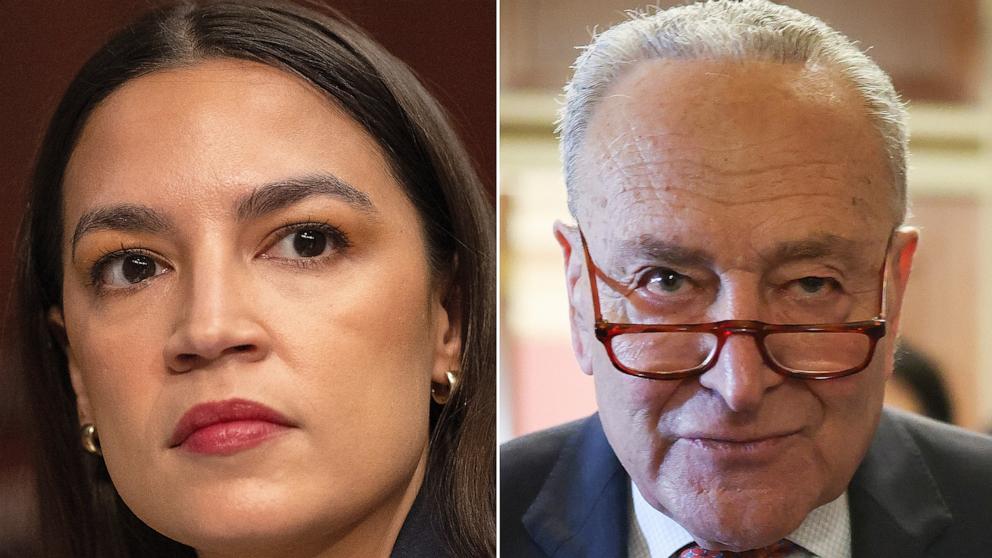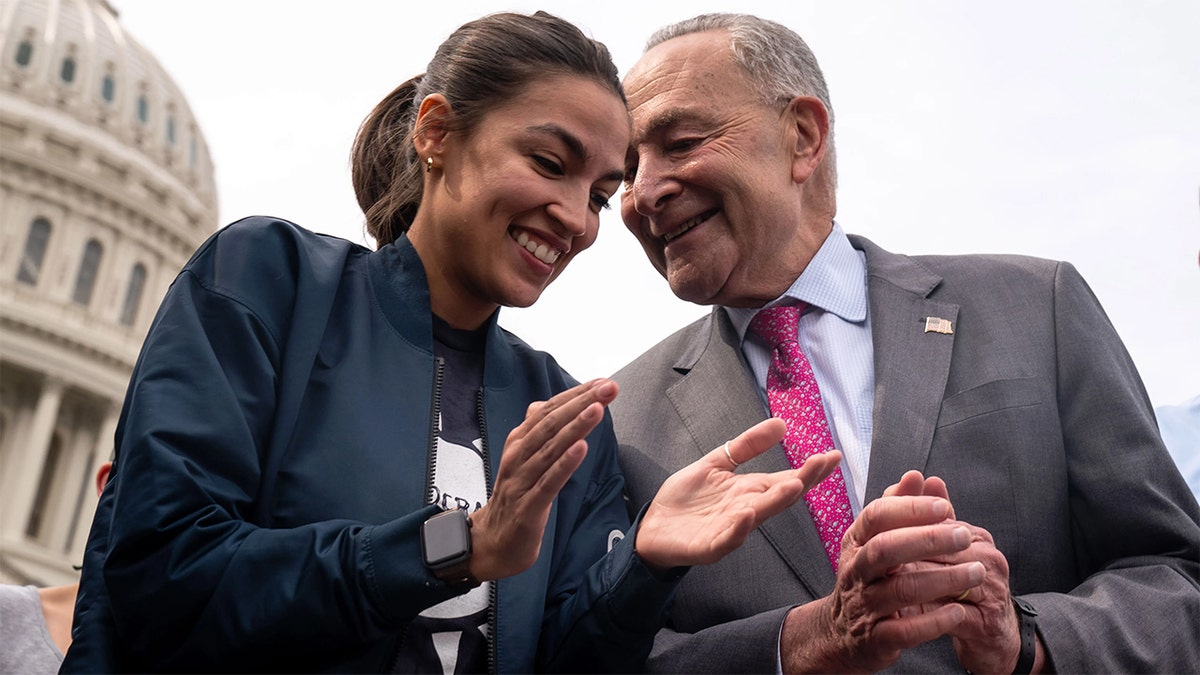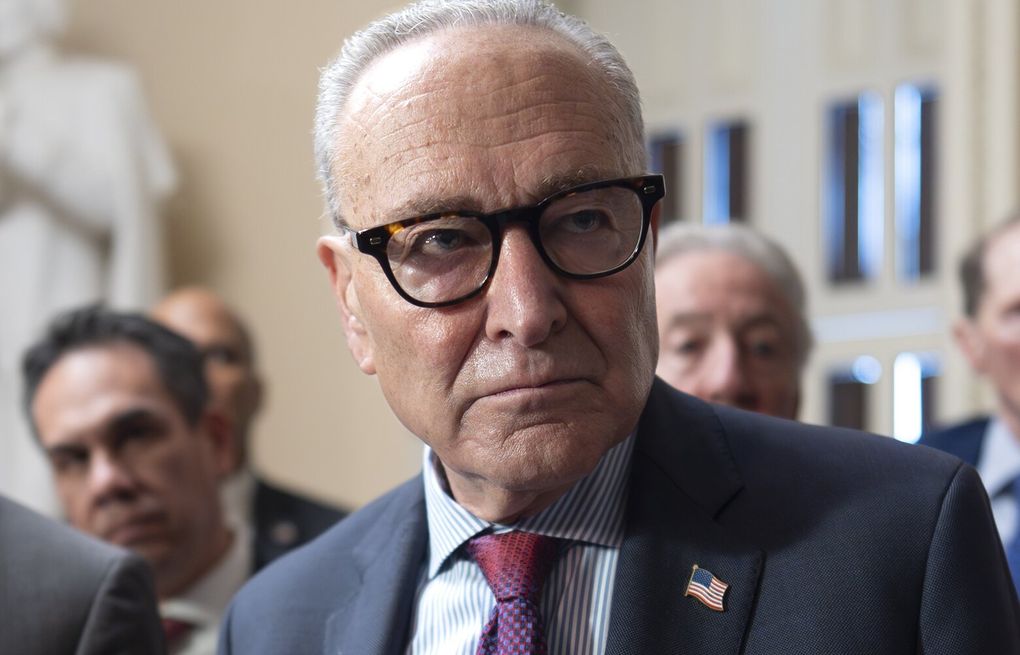In a dramatic twist during the intensifying government shutdown, Representative Alexandria Ocasio-Cortez (D-NY) declared on Thursday that Senate Republicans should bypass Majority Leader Chuck Schumer and negotiate directly with her on reopening the federal government.
The statement, delivered in a fiery press conference on the steps of the Capitol, immediately rattled Democratic leadership and underscored the internal divisions threatening to reshape the party’s power dynamics during one of Washington’s most consequential standoffs.
The declaration came as the shutdown entered its second week, leaving hundreds of thousands of federal workers furloughed, essential services disrupted, and public frustration mounting.
Ocasio-Cortez, widely known as AOC, argued that the public deserves more urgency than the back-and-forth posturing between Senate leaders and the White House.
“I am telling Senate Republicans right now: if you want this government open, come to me directly,” Ocasio-Cortez said. “Do not wait for Chuck Schumer to make the call. I am ready to negotiate today, right now, because the American people cannot wait.”
Her remarks marked one of the most direct challenges to Schumer’s authority from within the Democratic Party and quickly became the central talking point of the day in Washington.
Ocasio-Cortez’s decision to step forward as an alternative negotiating partner reflects broader dissatisfaction among progressives with how Democratic leadership has handled the shutdown fight.
She accused Schumer of being too cautious and reactive, saying his approach ceded ground to Republicans and left ordinary Americans paying the price.

“Families are missing paychecks, parents cannot buy groceries, veterans are waiting for benefits, and our leaders are still playing chess while people suffer,” Ocasio-Cortez declared. “This is not about egos, this is about solutions. If the leader of the Senate cannot move quickly enough, then step aside and let someone else do it.”
The comments struck at the heart of Democratic unity, raising questions about whether the party can maintain a cohesive front in the face of Republican pressure and White House messaging.
For Schumer, already under scrutiny after being mocked by Republicans for dismissing unfavorable polling, the challenge from one of his party’s rising stars could not come at a worse time.
Within hours of her statement, Republican lawmakers signaled interest in AOC’s overture, if only to exploit Democratic divisions. Senator Josh Hawley (R-MO) told reporters, “If Representative Ocasio-Cortez wants to sit down with us, we’re open to hearing her out. At least she’s willing to talk, which is more than we can say for Senator Schumer right now.”
Senator Lindsey Graham (R-SC) added a note of irony: “I never thought I’d see the day when we’d be looking to AOC for compromise, but here we are. Frankly, the Democrats look like they’re eating each other alive, and that helps us.”
Though it remains unlikely that Senate Republicans would seriously negotiate directly with a House progressive without leadership involvement, the optics of entertaining her offer provided Republicans with fresh leverage in the narrative battle over who bears responsibility for the shutdown.
The Trump administration, for its part, responded cautiously. President Donald Trump told reporters he found AOC’s statement “interesting” but suggested it was more about Democratic infighting than a real path forward.
“She’s basically saying Schumer is failing, which I agree with,” Trump said. “But negotiating with her doesn’t really make sense. Still, I’ll say this: at least she’s not hiding from the problem. She wants to talk, and that’s more than I can say about some of the other Democrats.”

Vice President JD Vance was sharper in his assessment. “This just shows what we’ve been saying — Democrats are divided, and they don’t know what they want,” Vance said during a Fox News interview.
“One day it’s Schumer, the next it’s AOC, the next it’s somebody else. Meanwhile, Republicans are unified: reopen the government without giving healthcare benefits to illegal aliens.”
Inside the Democratic caucus, AOC’s statement landed like a thunderclap. Schumer’s allies quickly pushed back, emphasizing that negotiations must run through official leadership channels. “This is not a time for free agents,” Senator Dick Durbin (D-IL) said. “We need unity, not theatrics.”
House Minority Leader Hakeem Jeffries sought to downplay the rift, insisting Democrats remained united in demanding protections for healthcare subsidies and resisting what they see as reckless Republican cuts.
“Representative Ocasio-Cortez is passionate about this issue, as we all are,” Jeffries said. “But let me be clear: Chuck Schumer speaks for Senate Democrats. Period.”
Privately, however, aides admitted the episode revealed fissures that Republicans could exploit. Some Democrats worried that AOC’s move risked making the party look chaotic and leaderless, especially as polling has begun to shift blame for the shutdown toward Democrats.
For AOC, stepping into the spotlight carries both risks and rewards. By positioning herself as an alternative negotiator, she burnishes her brand as a bold, uncompromising leader willing to challenge her own party’s establishment. This could energize progressives who feel alienated by what they view as timid leadership.
But the gamble also risks alienating moderates and senior Democrats who view party discipline as essential during high-stakes showdowns. Should her move backfire, she could be accused of undermining negotiations and prolonging the shutdown for personal gain.
Analysts noted the parallels to earlier moments when AOC broke from leadership, such as during debates over the Green New Deal and policing reforms. “She thrives on confrontation with the establishment, and this is her biggest stage yet,” one political scientist said. “But the consequences are larger too. If Democrats emerge weaker from this shutdown, some will blame her.”
The government shutdown, now entering its second week, has already forced hundreds of thousands of federal employees into furlough and delayed services ranging from veterans’ benefits to food assistance programs. National parks have closed, small business loan processing has halted, and uncertainty is rippling through the economy.
The immediate dispute centers on Democratic demands to restore Affordable Care Act subsidies and Republican insistence that the funding extension be “clean” — free of provisions that they argue extend taxpayer-funded healthcare to illegal immigrants. Democrats, however, argue that Republican cuts are sabotaging the healthcare system and raising costs for millions.
Against this backdrop, AOC’s call for direct negotiation with Republicans reflects both the urgency of the crisis and the frustration among progressives who feel their leaders are losing the messaging war.
Republicans have framed the shutdown as the “Schumer shutdown,” insisting Democrats are responsible for prolonging it by insisting on provisions that benefit non-citizens.
A New York Times/Siena poll found that only 27 percent of Americans supported Democrats shutting down the government over healthcare demands, while a majority sided with Republicans’ call for a clean resolution.
Republicans were quick to weaponize AOC’s remarks, painting them as evidence that even Democrats no longer trusted Schumer. “When your own people are begging us to cut you out of the deal, that says it all,” Senator Ted Cruz (R-TX) tweeted.
Ocasio-Cortez insisted her intervention was not about undermining Schumer but about accelerating a solution. “This is not personal,” she told reporters after her press conference.

“This is about the people who cannot pay rent because their paychecks have stopped. This is about the children who cannot get meals at school because funding has been disrupted. We cannot let leadership paralysis hold this country hostage.”
She emphasized her willingness to meet Republicans halfway if it meant restoring government functions. “We can debate healthcare, immigration, and subsidies later,” she said. “But first, let’s open the doors, get people back to work, and then fight about the rest.”
Her comments drew mixed reactions from progressive allies. Some applauded her boldness, while others worried she was giving Republicans exactly what they wanted: evidence of Democratic disunity.
Despite the political drama, the practical path to reopening the government still runs through Senate leadership and the White House. Without Schumer’s involvement, it is unlikely that any deal brokered with a single House Democrat — even one as high-profile as AOC — could pass.
Yet by inserting herself into the conversation, Ocasio-Cortez may influence the tone and direction of negotiations. Her call for urgency and pragmatism could pressure Schumer to accelerate talks, while her willingness to compromise may soften Republican resistance.
Whether or not Republicans take her up on her offer, the moment has already reshaped the dynamics of the shutdown debate and cemented her status as a central player.
Representative Alexandria Ocasio-Cortez’s challenge to Senate Republicans to negotiate with her directly on reopening the government marks one of the most dramatic interventions yet in the ongoing shutdown crisis.
By bypassing Majority Leader Chuck Schumer, she has exposed deep rifts within Democratic leadership while giving Republicans fresh ammunition in the messaging battle.

For AOC, the move is both a bold assertion of leadership and a risky gamble that could either elevate her stature or isolate her from her party. For Schumer, it is a stinging reminder that his grip on the caucus is fragile. And for the American people, it is another sign that partisan theater continues to overshadow solutions as the shutdown grinds on.
As the days drag forward, the question remains: will AOC’s direct appeal to Republicans lead to a breakthrough, or will it deepen the gridlock? The answer will shape not only the outcome of the shutdown but the future balance of power within the Democratic Party itself.
